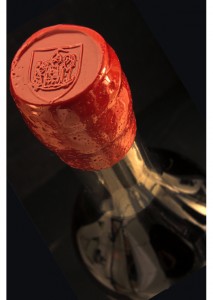Sealing Your Bottle of Cognac
 For more than a thousand years cork has been used for sealing wine and spirit bottles. It is a natural product harvested from cork trees which regrow their bark every nine years. It has been revered by traditional wine makers for centuries as the ideal seal. However, the cork seal is not quite so ideal for use with spirits as they can, over the years, degrade the cork. Eventually the cork will turn black and the exposed areas will become so damaged, the cork will drop into the bottle. It is for this reason that cognac producers always advise that bottles should never be laid down for storage. Corks are also porous and allow tiny quantities of air and spirit to pass through, thereby aiding evaporation. Cognac producers have long recognised this problem so today the quality of the seal is much improved. This has been achieved partly by the introduction of semi synthetic cork mixtures and partly by encasing the top of the bottle with some form of capping material.
For more than a thousand years cork has been used for sealing wine and spirit bottles. It is a natural product harvested from cork trees which regrow their bark every nine years. It has been revered by traditional wine makers for centuries as the ideal seal. However, the cork seal is not quite so ideal for use with spirits as they can, over the years, degrade the cork. Eventually the cork will turn black and the exposed areas will become so damaged, the cork will drop into the bottle. It is for this reason that cognac producers always advise that bottles should never be laid down for storage. Corks are also porous and allow tiny quantities of air and spirit to pass through, thereby aiding evaporation. Cognac producers have long recognised this problem so today the quality of the seal is much improved. This has been achieved partly by the introduction of semi synthetic cork mixtures and partly by encasing the top of the bottle with some form of capping material.
In the early twentieth century tin caps were used. This helped protect the cork and seal the bottle further. These caps had the added advantage of allowing producers to print their name on the top as a form of advertising. Today, tin caps have been replaced with light alloy or plastic. Plastic or wooden topped corks are also now used as they make the corks much easier to remove and replace.
Top quality and old vintage cognacs are often purchased by collectors and investors. To maintain the value of each, a complete seal is very important. Wax sealing is a good answer to this problem and one that has been used for over a hundred years, but sometimes the wax can become brittle and break off with careless handling. More modern waxes and the use of semi-synthetic corks now provide much greater stability of the cork and increase the long-term quality of the cognac in the bottle. Collectors of old vintage cognacs that have been bottled in the last quarter of a century can now expect the cognacs to remain in perfect condition for a much greater length of time.
